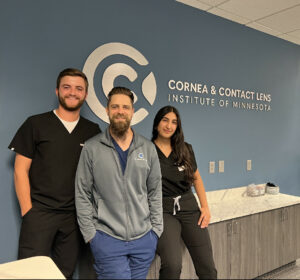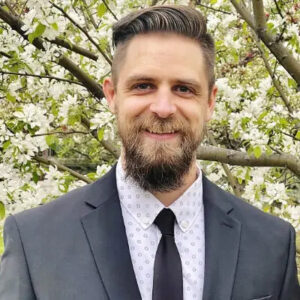
Dr. Holland, center, with fourth-year optometry school students. Dr. Holland says it is gratifying to be helping to educate the next generation of students. Having the students in his office also has been a boon to the practice’s operations.
Training fourth-year optometry students and transforming your ability to delegate.
By Zachary Holland, OD, FSLS
Sept. 27, 2023
Recruiting and training fourth-year optometry students can elevate the care and experience patients have in your office, and can change your experience as a practice owner, greatly propelling your ability to delegate, become more efficient and more profitable.
Gain a Reputation as a Great Place for Fourth-Year OD Students
Our practice has hosted fourth-year OD students since its inception. However, I have grown the reputation of our office as a rotation site to three schools in a way that appears to guarantee students every rotation. You’ve got to offer what students want in a rotation. And this may mean altering aspects of your clinic if you are invested in participating as an externship site.
So, what do students want? In my experience, autonomy and mentorship with a specialty in eyecare. I’ve worked with more than 50 students over the past seven years, and their expectations are evolving, but almost always they want to be treated as a colleague. By allowing them the freedom to see patients without someone looking over their shoulder, and involving them in the treatment and management of their cases, it both builds their confidence and increases the likelihood that they will pass down quality reviews to future students.
Now, if you don’t actually like teaching, or only want to fake it in an attempt to utilize the students as free labor, this isn’t going to work out. Having a genuine ability to help students gain tangible up-to-date clinical knowledge is key. Be prepared for the students to be on top of their knowledge. While their clinical skills may need fine-tuning, their book knowledge is often topnotch.
Teaching an OD Student from Ground Up by Delegating
This is the most infuriating part of having fourth-year interns at my practice. Over the course of 10-12 weeks the students have to learn all of the logistical processes of your clinic (often your individual EHR is the biggest hurdle). Generally, week one is orientation and learning your EHR system. Week 2-3 is learning logistics, practice flow and doctor tendencies. Between week 4-12 is when most of the clinical learning happens for the students. But these weeks are when the students are the most valuable to the practice. They operate as mini-doctors and see patients mostly independently in my practice and then I double-check necessary testing and we work together for specialty lens fittings.
Unfortunately, at the end of the rotation when new students start, we start this process all over again. My practice has mitigated this constant training process in two ways. First, having a set protocol and training regimen will allow all students to get similar experiences and make sure you aren’t missing anything. I suspect most clinical sites already do this.
I have delegated a lot of the logistical and administrative training to my clinical technicians. Because my site is a specialty contact-lens rotation, my scribe/tech teaches the students the nuances of my desired chart documentation for both contact lenses and corneal disease. She also teaches the students how to order specialty lenses from the labs and utilize our specialty-lens tracking system. This leaves me to teach clinical evaluation, treatment and management.
How the Students Grow My Practice
My patients have become accustomed to interacting with fourth-year students during their exam. There are three obvious ways I’ve used the fourth-year students to grow my practice.
First, patients love student interactions. Especially irregular cornea patients. It appears most patients feel special if their case can aid in teaching the next generation of doctors.
We use the words “teaching institute” with our patients. When I verbalize basic exam findings to either my scribe or the students it really exemplifies the extent to which we are hyper-examining each patient. Most patients have no idea of the complexity of their eyes. This approach drives home the extent of quality of care they are receiving and adds prestige to my clinic in the eyes of my patients.
Other Articles to Explore
Students increase efficiency in my practice once they are fully trained. They essentially operate as mini-doctors, seeing patients on their own and then reporting back to me when the examination is complete. With four exam rooms, I can have two students and two techs working up patients all at the same time.
If my students reduce the amount of time it takes for me to see a patient by five minutes, and charting by five minutes for each appointment, I can see at least 4-5 more patients per day. Multiply that by your revenue per patient and you are instantly more profitable.
Most valuable to my clinic is the high level of discussion that occurs between the students and I. My clinical staff has absorbed significant advanced knowledge by just listening to the discussions that I have with the fourth-year students on a daily basis. My tech/scribe knowledge base is unmatched, and they now see patients almost to the level of fourth-year students; refracting, using the slit lamp and formulating treatment and management plans prior to me seeing the patient.
How Do You Set Up a Fourth-Year Rotation Site?
Contact your nearest optometry school or your alma mater to set up a fourth-year rotation program.
It will probably take six months to set up a rotation site with all of the back-and-fourth paperwork with an optometry school. But it will take even longer to develop a good reputation, so that students will pass down a great recommendation to the lowerclassmen. Definitely start with 1-2 students per year to feel out the program and set yourself up for success.
Beware, if you practice in a different geographical location from the school you are contracted with, you may get fewer participants. I don’t get many students from California being in Minnesota, especially in the winter unless they are very interested in the specialty they can learn at my practice.
What Students Say
“Working with Dr Holland at CCLIM has been an absolute pleasure. He’s been such an impactful mentor in developing my clinical skills and teaching practice management. The staff have created a collaborative working environment and patients are very appreciative of the time we spend with them and the dedication toward their custom visual needs.”
“Dr Holland and his staff create the ideal learning and working environment. As a student doctor, I have been able to collaborate with Dr Holland and his technicians to provide excellent care to patients in an efficient manner. My rotation at CCLIM has provided valuable experience and knowledge in the ins-and-outs of private practice while also sharpening my clinical skills. I can’t thank Dr Holland and his staff enough for welcoming me as part of their team.”
Make Your Schedule Work for Students, Too
You may need to adjust the number of patients you see during times of student breaks or transitions to new students. I see a few less patients per day in the early summer when students are fresh into their first rotation. But I can easily schedule many more patients in the second half of each rotation and absorb walk-in or more emergency patients without setting myself behind.
The investment we have made into training fourth-year students has paid off in an expanded ability to serve patients and grow our practice. Also, after years of working with students, I have built a mini-referral network across the nation.
 Zachary Holland, OD, FSLS, is the owner of Cornea & Contact Lens Institute of Minnesota. To contact him: drholland@corneaandcontactlensinstitute.com
Zachary Holland, OD, FSLS, is the owner of Cornea & Contact Lens Institute of Minnesota. To contact him: drholland@corneaandcontactlensinstitute.com

























